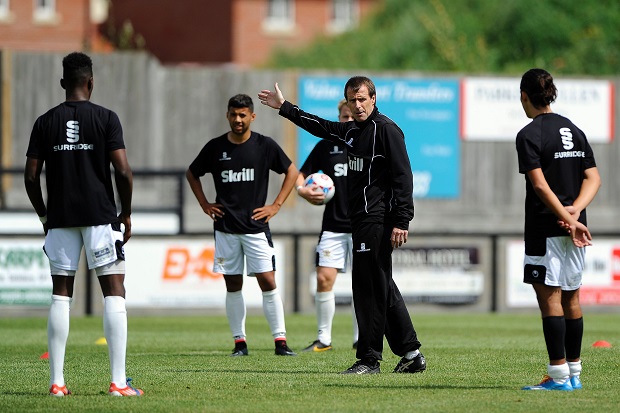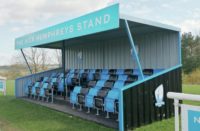By Ian Ridley
THE TWO biggest – and most difficult – promotions in English football, the professionals will tell you, are from Championship to Premier League and Conference to Football League.
At the top, many Championship clubs are spending big in search of the massive TV money available in the Premier – which some analysts say could double to £10 BILLION in the next deal.
So it is in Non-League, where the number of noughts on the cheques may be fewer but some clubs stretch themselves ever further in pursuit of promotions to play with the bigger boys then stay there.
As hopes and dreams kick off a new season, it is worth remembering, though, that the plights of Salisbury City and Hereford United, for example, testify to the dangers of either chasing money to take off or of flying too close to the sun.
With so many clubs frequently running into financial trouble despite attempts to impose regulations and fair play, surely the time has come for a radical rethink of how the English game is structured.
Forget FA chairman Greg Dyke's ideas for B teams and League Three and instead let's contemplate something that will really help the grass roots rather than the elite end that has enough money of its own to help sort out the England team.
The campaign in recent seasons has been for a third promotion place from the Conference, and the idea has merit to help rather than hinder progress. But why stop there? Instead of three up, why not 24?
Let's have a League Two North and South, and a revamped Conference, that will see North and South divisions as now, but which offer more chance of making it into the League for those part-time clubs with the potential and right infrastructure.
The objections will be long and loud, probably led by the Skybet League and the Vanarama Conference themselves. So let's examine the main ones first.
Back in May, I mentioned the idea to senior officials when a guest of the wonderful Prostate Cancer UK charity at the League Two play-off final. Can't do it, they told me. Ours is a national competition.
Really, what happened then for more than 35 years until 1958 when the lowest division, the old Third, was regionalised and gates were huge?
The Conference, meanwhile, will be cast in the role of turkeys voting for Christmas, as they lose their top clubs.
Rather than considering the politics and vested interests of administrators and organisations, however, let's think of clubs, communities and fans and what they might want. And what would make economic sense.
Because, with some 80 per cent of League clubs reported to be in debt – and liable to go under should those debts be called in – and having experienced first hand as a Non-League chairman the agonies of trying to balance books, I know that the status quo does not add up.
Players' wages are always the biggest cost for any club but lower down, their expenses along with club travel costs, assume greater significance. Regionalisation would not only cut those costs but increase revenue.
Check some of the midweek fixtures scheduled this season. On Tuesday February 10th, for example, Plymouth Argyle will make a round trip of 450 miles to Wycombe Wanderers in League Two.
On the same night in the Conference, Eastleigh are due to go to Southport – 500 miles in total. Crazy.
Regionalisation would produce more derby matches and higher attendances. It would create more events to interest the media, and perhaps even attract more TV interest, with its facility fees.
As for losing all its bigger clubs, with four down from League Two to accommodate two up and two down from the Conference North and South, then Non-League would gradually be getting some back and sending more ambitious clubs on their way up.
The Confererence was, after all, conceived for part-time clubs wishing to progress, not as a depository for bigger, relegated clubs to tread water for years. Or go under.
Arguments about who goes in what division? As if we don't have them now.
In this plan, the pathway would be widened for clubs both coming down and going up. The desperation, and thus the spending and the debt, might well decrease, though passion will never.
It would take some vision, some willingness to sacrifice vested interest for greater good, but it could be a game changer. A game saver indeed.
*************
IT HAS been a tortuous summer for Salisbury City and their supporters due to the ownership wrangle that has threatened their very existence.
It has also been tough for Steve Claridge, recruited as their new manager in anticipation of Conference South football, as he seeks to get back into the game he loves so deeply.
I know Steve well, having written two books with him and been the chairman who hired him at Weymouth, where he lifted the club from 17th to 2nd in a season and more than doubled crowds to an astonishing average – in the Southern League – of 1,490.
He has a comfortable life these days as TV and radio pundit and heads his own academy that develops young players.
But the management flame burns intensely inside him. He is shrewd on and off the pitch, knows how to recruit players and how to organise and inspire them, all within budget.
I hope it yet works out for Steve and Salisbury somehow, but if not, he gets the chance somewhere else soon to show himself again the smart leader I know.
*********************
STAMFORD AFC of the Evo-Stik Northern Premier League are due to move to a new edge-of-town stadium this Autumn. Good luck to this smashing club if it helps them survive and prosper.
Before they go, I would urge all who love Non-League traditions to visit their charming Vic Couzens stadium, as I enjoyed doing for a pre-season friendly against Histon. (And how lovely is evening football at this time of year?).
With four church spires visible from Kettering Road, it might just be good for the soul too.





















